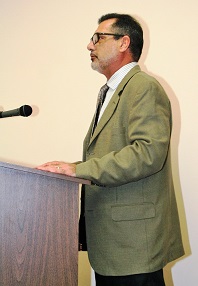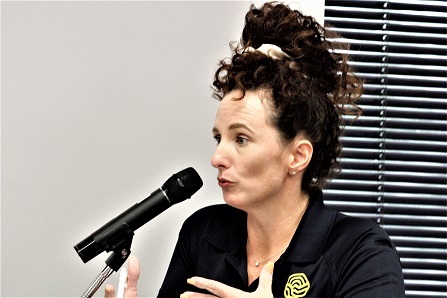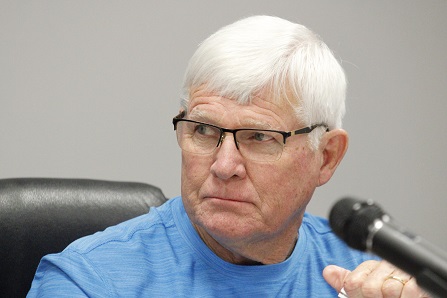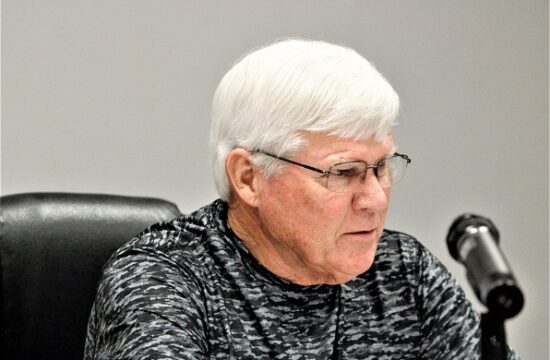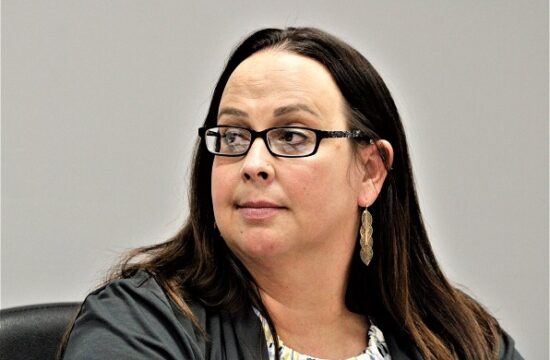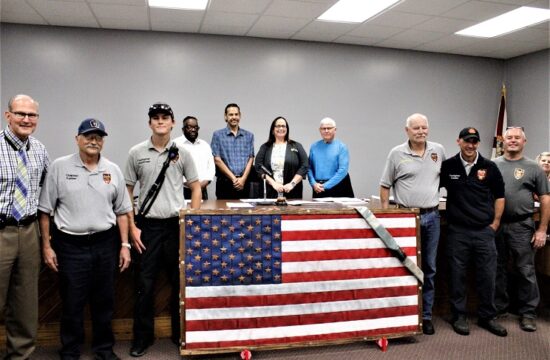Steve Minnis of the Suwannee River Water Management District fields questions regarding the Nature Coast Water Supply Authority.
By Terry Witt – Spotlight Senior Reporter
Chiefland City Commissioners Monday were encouraged to join the Nature Coast Regional Water Supply Authority in an era when water use permits are reviewed closely for their impacts on other users, and on natural systems like rivers, streams, springs, lakes and the aquifer.
The city commission has resisted joining the NCWSA in the past and still isn’t sure whether the agency could provide the type of benefits it would need to protect its valuable water well property north of town or fight potential water transfers from South Florida cities.
Chiefland’s water use permit expired today (Feb. 11) and the city is applying for a permit renewal from the Suwannee River Water Management District. Steve Minnis, director of business and community services for SRWMD said the district will closely review the city permit before issuing a renewal.
“When we renew the city’s permit we look at impacts. We look at minimum flows and levels. Things are going to likely get more restrictive than they are right now,” Minnis said.
Minimum flows and levels are set by water management district rules. The Suwannee River, for example, can’t drop below a certain level before natural systems are harmed. The aquifer can’t drop below a certain level before springs and wells dry up. The district sets the minimum flows and levels to prevent harm to natural systems or to other users.
Minnis spoke to the board about water supplies and regulatory and permitting programs operated by the district.
City Manager Mary Ellzey encouraged the board to postpone any decision on whether to join NCWSA, particularly since three of the commissioners are new to the board and don’t have enough background to make an informed decision at this point. The board took no action.
Mayor Chris Jones said he would like to pursue the idea of potentially selling water to neighboring cities that might need a new water supply at some point in the future, but he was also interested in protecting the city’s undeveloped well property north of town. A rich vein of freshwater flows beneath the 33-acre well property. SRWMD owns property adjoining the city’s wellhead land.
Jones asked Minnis if the city could control the process of contracting with a neighboring community if Chiefland wanted to sell water to neighboring communities, or would the water district and NCWSA have a role to play in deciding whether the city could sell its water.
“The city would remain in control if you desire. You would enter into some type of interlocal agreement with the Nature Coast Regional Water Supply Authority to determine how much and the cost for the authority to take it or Fanning Springs or Dixie County,” Minnis said.
Current members of NCWSA are Fanning Springs, Gilchrist County, Dixie County, and Bell. The agency’s internet site said Chiefland isn’t a member because of a lack of understanding.
Jones asked a “what if” question concerning the future toll road that may pass through the Chiefland area bringing traffic from the south. He wondered if there was any potential for the city to earn revenue from selling water in connection with the toll road if it were to be built in this area.
“The other thing, by being a member of the authority and from an interconnect standpoint, I think you would see some interest from water management in exploring partnerships to make that happen,” Minnis responded.
Commissioner Rollin Hudson asked if SRWMD has ever denied a city water permit and whether Chiefland’s water permit could be denied.
“You may not be denied a water use permit but you may not be able to use some of that source you have; you may have to use alternative sources to ensure that the existing legal users are protected as well as the natural systems are not harmed,” Minnis said.
Minnis, using a “what if” example. said if the city‘s renewal shows some impact on minimum flows and levels, the city might have to make arrangements to offset the impacts.
“If you are showing an impact, you are going to have to mitigate for that to offset that impact and that’s certainly not cheap, or you could get your permit renewed at existing levels for a five-year time frame,” Minnis said. Water use permits are typically issued for 20 years.
Hudson asked another “what if” question. What if there was a doomsday situation and Chiefland was denied a permit. What then?
“We wouldn’t do that. You’re going to have a quantity and it’s already in the model,” Minnis said.
He added there are a lot of options available to the city by being in the NCWSA. Citing one example, he said the costs of building water facilities wouldn’t be borne by the city alone.
Chiefland businessman Stoney Smith said he is a strong supporter of NCWSA. He was one of the founders.
“This was started years ago by myself, Kelby Andrews and the former executive director Jerry Scarborough (of SRWMD). The idea was to get the most credence and authority and get more grants and assistance for the community,” Smith said. “I want to keep this discussion as positive as possible; as a taxpayer, landowner and businessman, I totally want to endorse this idea, so you don’t have to ask me; if I call the mayor and ask him, I would be on his committee or whatever to see this development of the Drummond property endorsed.”
The Drummond property refers to the city’s future well site north of town, which is sometimes referred to by other names including Drummond property and wellhead property. The 33-acre site consists of vacant land. A rich vein of freshwater flows under the site. When the city decides to develop a well at the site and extend lines to city residents, there would be expenses. Smith said NCWSA could help with those costs.
“Obviously you ask the question; the city can be in the top row, get your (water) tank, get your permit, get your well, get your lines, everything you want out of this, especially with the investment landowners and taxpayers already have. Mary Ellzey is not going to be here forever. Steve Minnis is only going to be here a year or two. If you get these two guys working on it we could get this project done,” said Smith, a resident of Fanning Springs and a Chiefland businessman
Smith continued: That’s what we need, the city is moving north. If you haven’t been between here and Fanning to see the new scrapes (development) on the ground, you need to do that. All the landowners, Otter Creek, you mentioned the toll road; those are potential customers.”
Minnis encouraged commissioners to begin attending the NCWSA board meetings to get better acquainted with the organization. The next meeting of NCWSA is at 4 p.m. on Feb. 19 at Fanning Springs City Hall.
Jones asked Minnis if Fanning Springs and Trenton had enough water for their cities. Minnis responded that both have adequate supplies but they could need more water in the future depending on growth.
Minnis produced a map showing the percentage of water use by various entities in the water district, with agriculture using 54 percent of the water; livestock 4 percent, commercial industrial, institutional, mining and dewatering using 28 percent; public water supplies (primarily cities) 5 percent; homeowner wells 6 percent; thermoelectric generation (cooling water for power plants) 1 percent; landscape and recreation 2 percent.
Agriculture and livestock account for nearly 140 million gallons of water used daily, while cities about 13.2 million gallons daily.
The percentages and gallons cited above are 2015 estimated groundwater use numbers. Total groundwater use was 253 million gallons daily.
Jones said he would like to investigate how the NCWSA might benefit the city.
“I’m just one person. I do think if we would do this in a positive manner where the city retains its rights; possibly for the city to make money off this situation, for the potential growth of the city. I would be willing to entertain this to see where the city goes with this,” Jones said.
When a reporter suggested there might be politics involved in water use permitting by the water district, given the fact that agriculture receives far more water than all the cities combined in Levy County, Minnis took exception to the statement.
“If I may, we base our decisions upon science, not politics. We have statutes and rules we go by,” Minnis said.
Ron St. John, owner of Alliance Dairies, is permitted to withdraw more than 1.6 million gallons of water daily (1.6544 mgd) for his dairies, according to the district. Chiefland, by contrast, is permitted to withdraw more than a half-million gallons per day – (0.5672 mgd or a maximum of 0.8792 mgd).
A number of years ago, questions were raised about whether Chiefland’s wellhead property north of town was located within the city’s Municipal Service District, or was it in Fanning Springs MSD. Chiefland ultimately prevailed. The city hasn’t backed away from the position that the property is within its MSD. Municipal Service Districts are areas designated for the future growth of a city. With the wellhead site being in Chiefland’s MSD, Fanning Springs has no claim to the water.
There have also been suggestions that the city should donate the land back to the water district. The city has no interest in donating the property back to the district.
————–
City of Chiefland Regular Meeting February 10, 2020; Posted February 11, 2020


